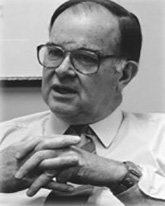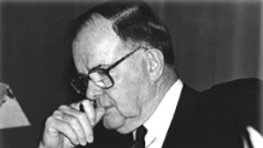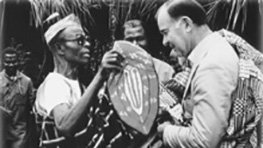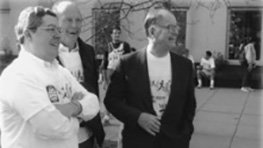7th President of the World Bank Group, July 1, 1986 - August 31, 1991
Conable's extensive political skills made him an effective spokesman for the Bank, persuasively advancing the Bank's reform agenda. He enjoyed having a platform from which to speak about major development issues. He made the issues relating to the Bank's central mission - the fight against poverty - the focus of his presidency. He thought that the Bank, with its emphasis on structural adjustment during the Clausen years, had lost sight of the importance of fighting poverty.
He was personally committed to this fight and to other issues that became important to the Bank in the 1980s. He recognized the significance of environmental and social demands and moved the Bank forward to meet them. Publicly he advocated increasing the Bank's attention to environmental problems, promoting programs to curtail population growth, and advancing the role of women in development. He developed a particular affinity for the problems of Africa, exacerbated by the twin problems of the debt crisis and the oil shock. In this, he gained admirers among the executive directors, management and staff of the Bank, and among the leadership of the non-governmental organizations that were pressing the Bank on various issues in the 1980s.
Personal History
Barber Conable was the first career politician to be appointed president of the Bank, and the only one without substantial Wall Street experience. He was born in a small town in upstate New York, Warsaw. He came from a legal background, and he himself took a law degree at Cornell University. He served in the military both in World War II and in Korea. After this he established a legal practice in New York but then opted for a political career. In 1962 he became a Republican member of the New York state senate. From there, he stood for the US Congress, being first elected in 1964 and then returned for nine further two-year terms. His progress in the House of Representatives was steady rather than spectacular, but he acquired a valuable reputation with members of both parties for his integrity and reliability.
His principal expertise was in budgetary issues, and in later years, he became increasingly concerned in strengthening the United Nations. Strongly opposing the view of America's emerging neo-conservative lobby, he argued in 1995 that strengthening the organization was vital because "the world may not be willing to be policed by the United States". Conable's legislative colleagues regarded him as a man of integrity and a skillful parliamentarian. His statesmanlike qualities, financial knowledge and his solid grasp of complicated trade and tax issues made him seem ideal to lead the World Bank, despite the fact that he was completely unknown within World Bank circles, including the Executive Directors and the leaders of the Bank's member countries.
Reorganizing the Bank
The changes in the Bank's organization were drastic. The rapid and substantial change caused personal stress, organizational tension and major disruptions in the work process. Four hundred staff positions were cut, the entire staff had to re-apply for the newly created positions, and the reorganization was criticized both internally and externally for the disruption it caused, the costs associated with it, and the demoralization of staff. The process lasted much longer than anticipated, and in 1989 a “fine tuning” exercise completed the reorganization. Conable recognized the effects of this action: “The process has been a difficult and painful one so far. While much of the media and public attention to the reorganization has been negative, there has also been some balancing reinforcement of the image of the Bank as an institution willing and able to confront the need for improvement and change, and an institution seeking to be fair and generous to those most affected by the change process.”
Funding the Bank
While the reorganization was being implemented, Conable took on other challenges, the most pressing being the ongoing Ĺ·ĂŔČŐb´óƬ replenishment negotiations. He found the U.S. administration to be more sympathetic than it had been for his predecessor, and the Ĺ·ĂŔČŐb´óƬ-8 negotiations were accomplished swiftly and smoothly. Conable then turned to the General Capital Increase (GCI) for the Bank, and was able to obtain solid support from the U.S. Congress. Conable's political skills and contacts were invaluable for this process, and he received well-deserved credit for this success.
Debt Crisis
The ongoing developing world debt crisis was another issue that faced Conable when he came to the Bank. During the Clausen tenure, the U.S.-sponsored Baker Plan was implemented to alleviate developing country debt, primarily by urging financial institutions and commercial lenders to lend new monies to countries engaged in acceptable structural reforms.
Calls for debt relief began to be heard from academics, journalists and parliamentarians. The U.S. administration under Reagan resisted this idea, and Conable accepted these objections, maintaining that continued adjustment would ultimately bring about a renewed flow of private capital.
But by the 1987 Annual Meetings, Conable conceded that the adjustment process and the resumption of growth were proceeding more slowly than was acceptable, and he announced that the Bank (together with the IMF) would assemble special debt-restructuring packages to reduce existing debt and supplement new lending. The situation did not significantly improve throughout 1988, and Argentina and Brazil were having extreme difficulties servicing their debt. Nicholas Brady, the U.S. Treasurer in the new Bush Administration, announced a new initiative that reversed the former position of the government, and proposed a mechanism by which selected countries could work out programs for debt relief. Conable worked closely with Brady in these discussions, and the Bank played a key role in the new debt strategy. By the end of Conable's tenure, five countries had debt and debt-service reduction plans in effect, and the Bank was effectively aligned with the U.S. government on the debt crisis.
The debt crisis demanded close cooperation between the Bank and the IMF, and Conable continued the practice of frequent consultation with his IMF counterpart that had been emphasized by Clausen. In March 1986 the two institutions had agreed to prepare jointly with donor countries policy framework papers as a prerequisite of the Fund's structural lending. In 1988 an embarrassing divergence in Bank/Fund policies related to Argentina forced the two institutions to formalize their working relationship. A Concordat was negotiated in March 1989, which allocated primary responsibilities between the two institutions and reaffirmed the continuing need for close collaboration.
External Criticism of the Bank
Conable faced a challenge which his predecessors had not needed to face - an increasingly high level of external criticism of the Bank's activities. The political fallout and the impact of adjustment lending from the painful economic reforms advocated by the Bank in the developing countries generated criticism of the Bank's methods. In addition, activist groups were beginning to focus on the Bank's impact on the environment, focusing on two particular projects, the Polonoroeste settlement program in Brazil, and the Sardar Sarovar Dam on the Narmada River in India. The Bank, which by virtue of its poverty-reduction objectives had considered itself beyond reproach, suddenly found itself under attack from a number of fronts.
Bank Response on the Environment
As an experienced politician, Conable was sensitive to external criticism of the Bank, and took direct actions to respond to this criticism. He admitted that the Bank had made mistakes in handling environmental issues in the past and needed to acknowledge and address these problems as they would arise in the future.
In May 1987 he addressed the World Resources Institute and said that the Bank would reform its environmental actions; the answer was not to avoid projects with environmental implications, but to become fully involved to strengthen environmental safeguards.
Conable involved the Bank in a number of highly visible international environmental efforts. The Bank increased its support of a global program to conserve tropical forests. Deforestation in Africa was addressed, and the Bank funded a program to protect the Mediterranean Sea. The Bank also joined with two UN agencies to implement the Global Environment Facility in 1990. Conable's forceful identification with environmental concerns changed the Bank's policies and public image.
The Bank's efforts to ameliorate the harmful effects of the Sardar Sarovar were deemed insufficient, and Conable finally asked an independent commission to review the project and make recommendations. The commission was headed by Bradford Morse, and its findings resulted in the Government of India asking the Bank to cancel its loan for the project. The Morse Commission ultimately inspired the creation of the Bank's permanent Inspection Panel, which was instituted in 1993.
Bank Response on Structural Adjustment Operations
Support for the Private Sector
The Bank also increased its activities to support the private sector during Conable's tenure, a reflection of his belief in the power of private initiative and entrepreneurship. The International Finance Corporation (IFC), the private sector arm of the World Bank Group, expanded its operations, moving vigorously into Africa and South Asia regions, and into new areas of activity, such as capital market development, corporate restructuring, privatization, and assistance to small and medium enterprises. IFC's commitments increased by 20-25% a year during Conable's tenure. In 1991 Conable successfully completed arduous negotiations for a capital increase for IFC. The Foreign Investment Advisory Service (FIAS), started in 1985, increased its activities in promoting the flow of private investment into the developing countries. In addition, the Multilateral Investment Guarantee Agency (MIGA) was launched in 1988 to insure private investors against political risks and thereby promote private investments in developing countries. In 1988 Conable appointed a private sector review group to recommend policies and changes that could enhance the effectiveness of the Bank's support of the private sector.
Expanding Membership
The Conable tenure at the Bank witnessed the breakdown of the Soviet bloc and the transformation of Eastern European economies. The G-7 looked to the Bank and the Fund to play a central role in the economic transition. (Indeed, Conable suggested as early as 1986 that the Soviet Union could become a member of the Bank, but the majority of the states of the former Soviet Union entered into Bank membership in 1992). The Bank participated in a comprehensive needs assessment of the Soviet economy. A World Bank office was opened in Moscow in 1991. Conable traveled to Eastern Europe to offer advice and assistance, and signed the first loan agreement with Poland in 1990. He assured the Eastern European countries that the Bank would be swift and flexible in offering assistance.
New Development Issues
With the end of the cold war, Conable saw the opportunity to speak up on issues that had long bothered development experts: the level of military expenditures, and the quality of governance. Conable urged that governments curtail their military expenditure and allocate the resources to more productive purposes. And he recognized that the effectiveness of the Bank's investment depended upon competent political processes within the borrowing countries. He used the forum of the Organization of African Unity to address “those aspects of governance that impede development and impair the quality of life - accountability, transparency, predictability, adherence to the rule of law.” He thus foresaw the importance of issues that would dominate the Bank’s development thinking in the coming decades.



